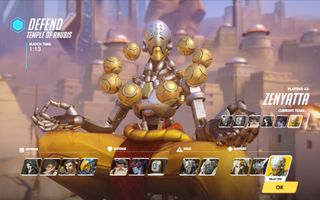
THE LOWS
Tom Marks: Unsupportive
Over the past two weeks, Blizzard has been releasing a slew of Overwatch gameplay videos, each showing off a full match from the perspective of a different character. From what I’ve seen, Overwatch looks great, having the same level of detail and polish we expect from Blizzard. The game itself is not my low, nor is the fact that they’re finally showing us exactly what we’ve wanted to see. My low is that we’ve now seen all three of the currently revealed support characters, and they’re all pretty dull.
I am, for all intents and purposes, a support main. I was a priest in WoW. I mained Janna, Sona, and Thresh in LoL. I have twice the hours logged as Medic than any other class in TF2. Healing, buffs, and backup is one of my favorite things to do in competitive games, but the supports’ abilities in Overwatch look bland and uninteresting compared to the rest of the game—and even compared the vibrant personalities of the characters that wield those abilities.
Mercy has the stereotypical heal beam with a slight twist in that it can change to a damage boost, Symmetra has a point and click shield and tiny turrets that seemed to blow up as easily as they were placed, and Zenyatta—my favorite of the three—has a debuff orb and a healing orb that you drop on someone then forget about. Their personalities are unique and cool, but their abilities follow bland archetypes with seemingly very little room for complex play. Even a game like Evolve, which has a whole host of problems, shook up the standard “medic” and gave the position a more engaging role to play.
I suppose I was just hoping for more unique support ideas from what is looking like a unique game overall. I am a bit disappointed, but will have to hold off full judgement until I’ve actually had a chance to play them for myself.
Tim Clark: The undead just won’t die
Our review this week of Telltale’s latest Game Of Thrones episode reminded me that, despite it being entirely relevant to my interests, I have not played any of the prior Game Of Thrones episodes, and now it seems too late to start. And that’s mostly because I stopped playing The Walking Dead right before the last episode of the first season, and despite buying the entire second season, I haven’t plucked up the courage to go back to see the end because I know it’s going to be baaaaaaaaaaaaaaaad.
Pretty much everything leading up to the climactic cliffhanger had been bad, and even the spoiler-free reaction from my friends and peers made it abundantly clear that more badness was inbound. So I left it frozen in digital aspic, with everyone on the verge of imminent trauma, but, crucially, still alive. And the odd side effect of that choice has been that I’ve felt paralysed about playing any of Telltale’s other games without finished off The Walking Dead first. Do any of you do that with games? Leave them at a key point because you don’t want the resolution to play out how you fear it will? Or… Have I gone mad.
PC Gamer Newsletter
Sign up to get the best content of the week, and great gaming deals, as picked by the editors.

Samuel Roberts: FTL hurt me bad
I’ve been getting back into the phenomenal FTL: Advanced Edition this week, having taken a few months off from the intergalactic roguelike following a particularly aggressive bout from March to September last year. I’ve finally mastered how to use all of the Kestrel’s systems in the game, using an even mix of hacking, mind control and most importantly cloaking to absolutely conquer the opening seven systems. It was going so well—full crew, barely dropping health bars on the journey to the last system in the game.
But apparently I don’t know FTL as well as I thought. Despite managing to beat the first form of the final boss without dropping many health points, in the second stage, where it unleashes a ton of drones upon you, my ship was almost instantly wiped out. It was a pretty heartbreaking loss, to be honest, but it just shows how in-depth the strategy of FTL is, and how much careful thought it takes to actually beat the thing.
I absolutely love this game to bits and I will never stop playing it.
Phil Savage: The definition of "exclusive"
This week, we got an early taste of how unbearable E3's console conferences will be for those of us not waving a flag for either Microsoft or Sony. Again, it's about the word exclusive, and what that word means. Sony Computer Entertainment's CEO, Andrew House, told investors how the Playstation's first-party lineup was “a little sparse”. Then, attempting to put a silver lining on things, he said this: “I will admit that [third-party exclusives] are, in the current publishing landscape, few and far between, but we were able to announce a full exclusive around a franchise like Street Fighter so that Street Fighter 5 is a complete exclusive for PlayStation 4.”
Last E3 we were treated to tortuous phrases like “coming first to consoles on Xbox,” used to imply exclusivity where none existed. Now we're just straight up misusing words. A “complete exclusive?” Tell that to the letters 'P' and 'C' that are sat next to each other on the official Street Fighter 5 website. I've already seen multiplatform gaming sites reprint this statement without mentioning the inconsistency. This is why it's so essential to give PC a space at E3, so we can challenge this attempt to remove the PC from the broader gaming conversation. We're here, we number in the millions, and you can't bury your head in the sand and pretend we don't exist.

Chris Livingston: Dissonarrative Ludonance
You're probably familiar with the concept of 'ludonarrative dissonance', the fancy-pants term coined by Clint Hocking for when your actions in a game run contrary to the game's story (for examples of this, see almost every game ever made). I encountered what is perhaps the opposite phenomenon this week, a situation in which I couldn't perform actions that would make perfect sense in the game.
The game was New York Mysteries: Secrets of the Mafia, a Myst-like puzzle/adventure game in which you must solve the mystery of mafia goons who are being melted into puddles of goo by butterflies (don't ask). The first puzzle came as the detective visits a dinosaur museum where a mafia don melted (seriously, don't ask), and finds the doorbell to be broken. I'm instructed to fix it, a puzzle which involves using scissors to cut wire from a broken light and use it to rewire the doorbell. What else could you possibly do in that situation besides DIY electrical repair?
Gee, I dunno. Knock on the door, maybe? Did it never occur to my detective, who is an expert at detecting things, that knocking on a door might be a solution that didn't involve tampering with live electrical wires? Later, I come across a cardboard box sealed with tape. Naturally, I can't open it with my hands (despite happily playing with live wires earlier), but I do have a key. As a member of Amazon Prime, which I order from constantly to justify being a member of Amazon Prime, I know the only way you ever cut through tape on boxes is with a key, because who the hell can ever find scissors? And yet, the key I found in the museum doesn't cut through the tape. As for the scissors I used earlier? They're gone. Having used them to cut a wire, I apparently then chucked them into the street. No, I need a third object to solve The Case of The Taped Cardboard Box That Cannot Be Opened For Some Reason.
Yeah, it's sometimes weird in games when you wind up doing things your character wouldn't logically do, but it's also weird when you can't do things your character logically should do.
Tom Senior: The nightmare game
The word "nightmarish" is overused, but absolutely applicable to Axiom Verge, which seems to have wormed its way deep into my brain without me realising. An uncomfortable dream that spawned me in a convoluted office building with walls made of flesh seemed standard, as nightmares go, but it was only on waking that I realised my brain was borrowing textures from the walls of Axiom Verge's odd alien planet. The texture—grey, dappled flesh with bursts of mechanical wiring and flasks of unknown pumping liquids—reappeared in another dream, which formed the substance into a series of randomised capital letters for reasons we will never know. I can only credit the subtle strangeness of Axiom Verge's pixel art for fuelling the imagination, to the extent that my brain felt the urge to play with it at night like putty.
Axiom Verge, by the way, is a very capable Metroid callback that serves as both a nostalgic hug and a nightmare-inducing psychic assault. I'm very fond of it for both reasons.
Hey folks, beloved mascot Coconut Monkey here representing the collective PC Gamer editorial team, who worked together to write this article! PC Gamer is the global authority on PC games—starting in 1993 with the magazine, and then in 2010 with this website you're currently reading. We have writers across the US, UK and Australia, who you can read about here.
Most Popular


